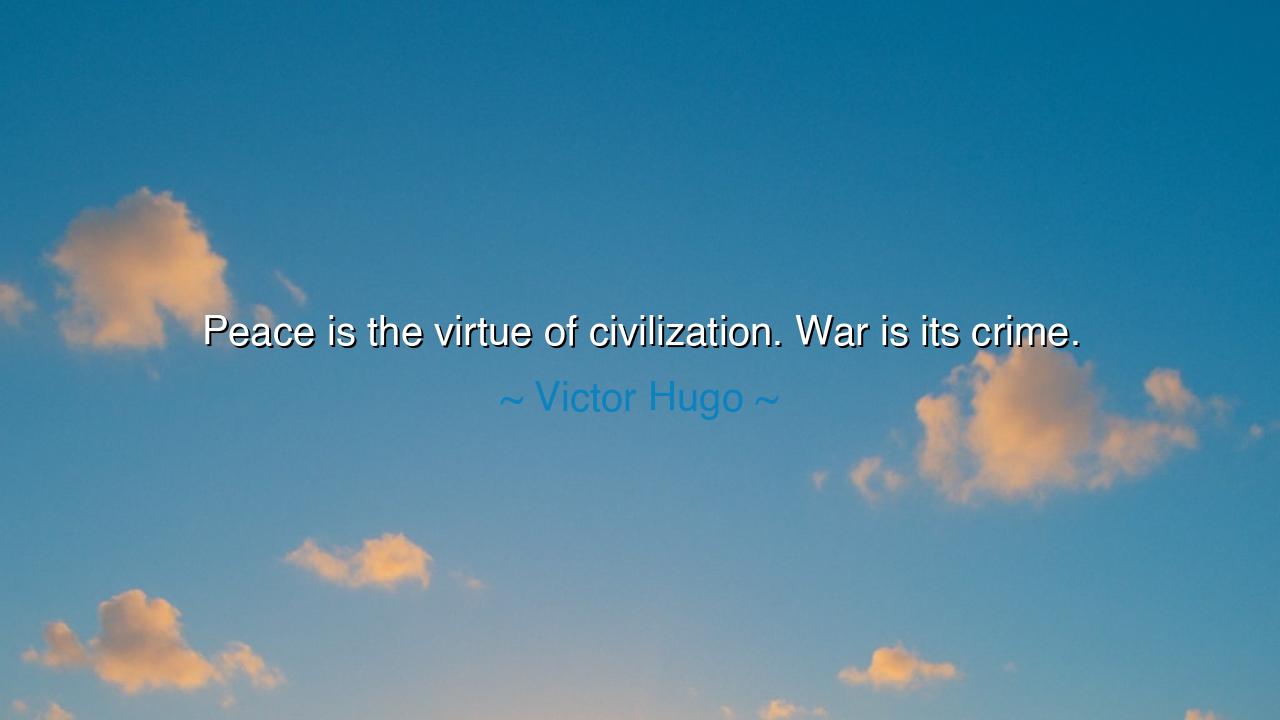
Peace is the virtue of civilization. War is its crime.






Hear the immortal words of Victor Hugo: “Peace is the virtue of civilization. War is its crime.” In this brief utterance, a world of wisdom is contained. For what is the measure of a civilization? Is it not its laws, its arts, its justice, its compassion? And what is the virtue that sustains these but peace—the calm in which thought flourishes, the soil in which love grows, the atmosphere in which truth may breathe? On the contrary, when men embrace war, they tear down the very edifice they have built, and civilization, instead of rising like a temple, crumbles into dust beneath the weight of its own crime.
The ancients long pondered the relationship between peace and greatness. The philosophers of Greece proclaimed that the polis, the city, was the crown of humanity, where citizens could pursue wisdom and beauty together. Yet when Greece turned against itself in the Peloponnesian War, brother fought brother, and the brilliance of Athens was extinguished in blood. Thus, history affirms Hugo’s judgment: peace is the virtue, the lifeblood, the triumph of civilization; war is its crime, the betrayal of all it has achieved.
Consider the story of Rome. At her height, she was the glory of the ancient world—her aqueducts carried life-giving water, her roads bound lands together, her laws gave order to nations. But Rome’s endless appetite for conquest drew her away from her virtue. She forgot that her greatness lay in peace, not plunder. Civil wars tore her heart, barbarian invasions finished the work, and the Eternal City fell. Rome’s crime was not her civilization, but her war. So too does every nation that exalts the sword above the plough condemn itself to decay.
And yet, let us not mistake peace for weakness. True peace is not the coward’s surrender nor the tyrant’s silence; it is the noble fruit of justice, the harmony of a people dwelling secure. War is easy, for it springs from hatred and greed. Peace is hard, for it demands patience, forgiveness, and wisdom. It is the higher path, the mark of true civilization. Indeed, the heroes who secure peace are greater than the generals who win battles, for they conquer not flesh and blood, but the passions of the human heart.
Look to the example of Mahatma Gandhi. Against the might of the British Empire, he raised no army, wielded no sword, yet he led his people to freedom through nonviolence. His power was not destruction but endurance; his strength was not bloodshed but truth. In him, we see the embodiment of Hugo’s teaching: civilization advances through peace, but war stains it with crime. Gandhi proved to the world that peace, wielded with courage, can humble empires.
The lesson is clear: if we are to call ourselves civilized, we must cultivate the virtue of peace. It must be the guiding principle in our families, our communities, our nations. Every time we choose reconciliation over revenge, dialogue over division, kindness over cruelty, we walk the path of civilization. But when we yield to anger, when we glorify violence, when we justify cruelty, we commit the crime of war—whether in the battlefield or in the heart.
Practically, this means we must begin where we are. Seek peace in the home by taming your tongue. Seek peace in your community by listening more than speaking. Seek peace in the world by refusing to glorify violence or profit from the suffering of others. Let each person be a builder of peace, stone by stone, act by act, until the temple of civilization stands firm against the storms of hatred.
So remember, O children of tomorrow: peace is civilization’s virtue, war its crime. Guard this truth as a sacred law. Exalt the peacemaker above the conqueror, honor the reconciler above the destroyer, and let your life bear witness to the higher way. For civilizations rise and fall, but the virtue of peace endures, shining like a light that no darkness can extinguish.






AAdministratorAdministrator
Welcome, honored guests. Please leave a comment, we will respond soon